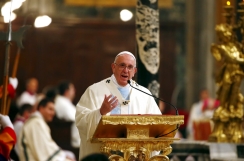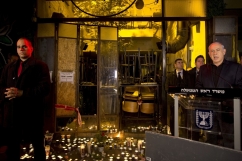Israel isn't happy about it, but there's not much it can do.
The "Comprehensive Agreement between the Holy See and the State of Palestine", signed in June, has come into effect following various administrative tweaks.
The treaty is, if you read some conservative news outlets, an outrageous betrayal of Israel by a Vatican which has a long history of anti-Semitism. The book of Revelation features heavily in some comments.
But what's really going on?
As treaties go it's fairly routine, dealing with "essential aspects of the life and activity of the Church in Palestine" including the freedom of the Church to operate and of Christians to practise their faith and participate fully in society. What could be fairer than that?
It is, of course, the s-word. For Israel, the problem lies in describing Palestine as a state. It is not really interested in the content of the treaty, but for the Vatican – a sovereign territory as well as the headquarters of the Roman Catholic Church – to recognise Palestinian statehood is teeth-grindingly infuriating.
In fairness to the Vatican, it had already done so. Recognition by the United Nations had long been a goal of the Palestinian Authority. In spite of resolute opposition led by the US – and including Britain – this was achieved in November 2012, when Palestine was given the status of 'non-member observer state'. The Vatican formally acknowledged its status in February 2013, but this is the first time it has entered into a diplomatic treaty with it.
Palestine's new status gave it important new rights, including access to the International Court of Justice and the International Criminal Court.
More importantly, it signalled the world's commitment to a two-state solution in the Holy Land: Israel had a right to exist, but so did Palestine. However toothless and half-hearted the international community has been in its attempts to make this happen, it was at least an expression of intent.
Whether – because of Israel's continued encroachment on Palestinian territory and stranglehold on its economy – this is any longer an achievable goal is open to question. Israel's right-wing government includes members who believe in a greater Jewish state rather than a two-state solution – arguably including Prime Minister Netanyahu himself, who made his position clear before his recent re-election (he later backtracked under American pressure). For Israeli diplomats, for Palestine to enter into state treaties before it's a state is jumping the gun.
What shouldn't be in doubt, though, is the Vatican's commitment to Israel – and any attempt to paint the treaty as some sort of stab in the back to the State of Israel is simply mischief-making.
The present and previous popes have been crystal clear about this. In its statement about the Comprehensive Agreement, the Vatican refers to its "support for a negotiated and peaceful solution to the conflict in the region" – hardly an anti-Israel position.
Under Pope Francis a landmark statement about the relation between Jews and Gentiles has made it clear that it is impossible to be an anti-Semite and a Christian. He's even said that whoever does not recognise the State of Israel falls into anti-Semitism.
These aren't the words and actions of someone who's opposed to Israel. But neither is this the behaviour of someone who's prepared to allow his theology or how he cares for the vulnerable to be influenced by the voices of hatred and rejection.
Israelis and Palestinians occupy the same small space. They have not yet succeeded in working out how to share it in any way that looks remotely just and fair.
As long as the debate remains at its current temperature, it's hard to see how they ever will. But Christians who care about peace really must stop stoking the flames by treating everything that recognises the dignity of Palestinians as a betrayal of Israel. We can do better than that.
Follow @RevMarkWoods on Twitter.
















